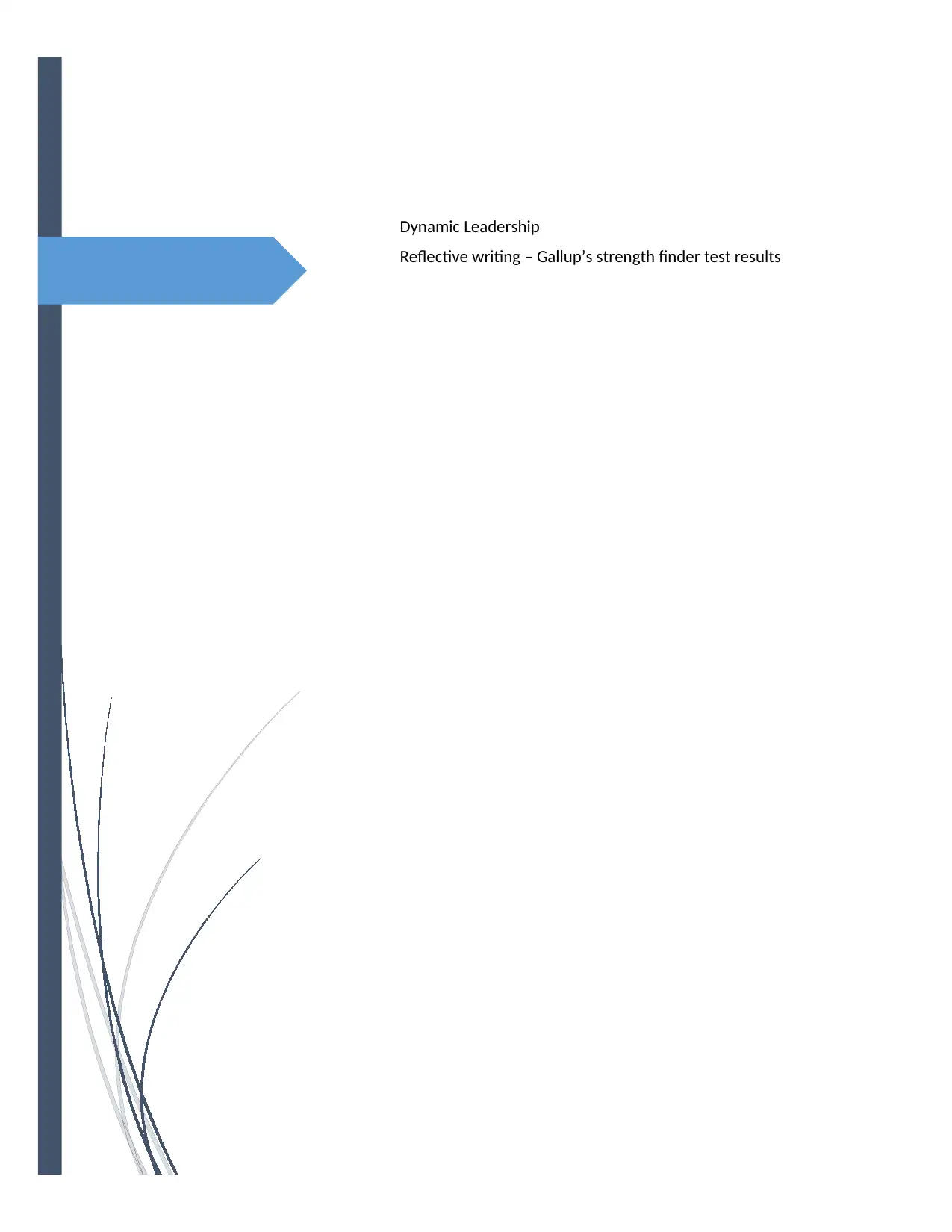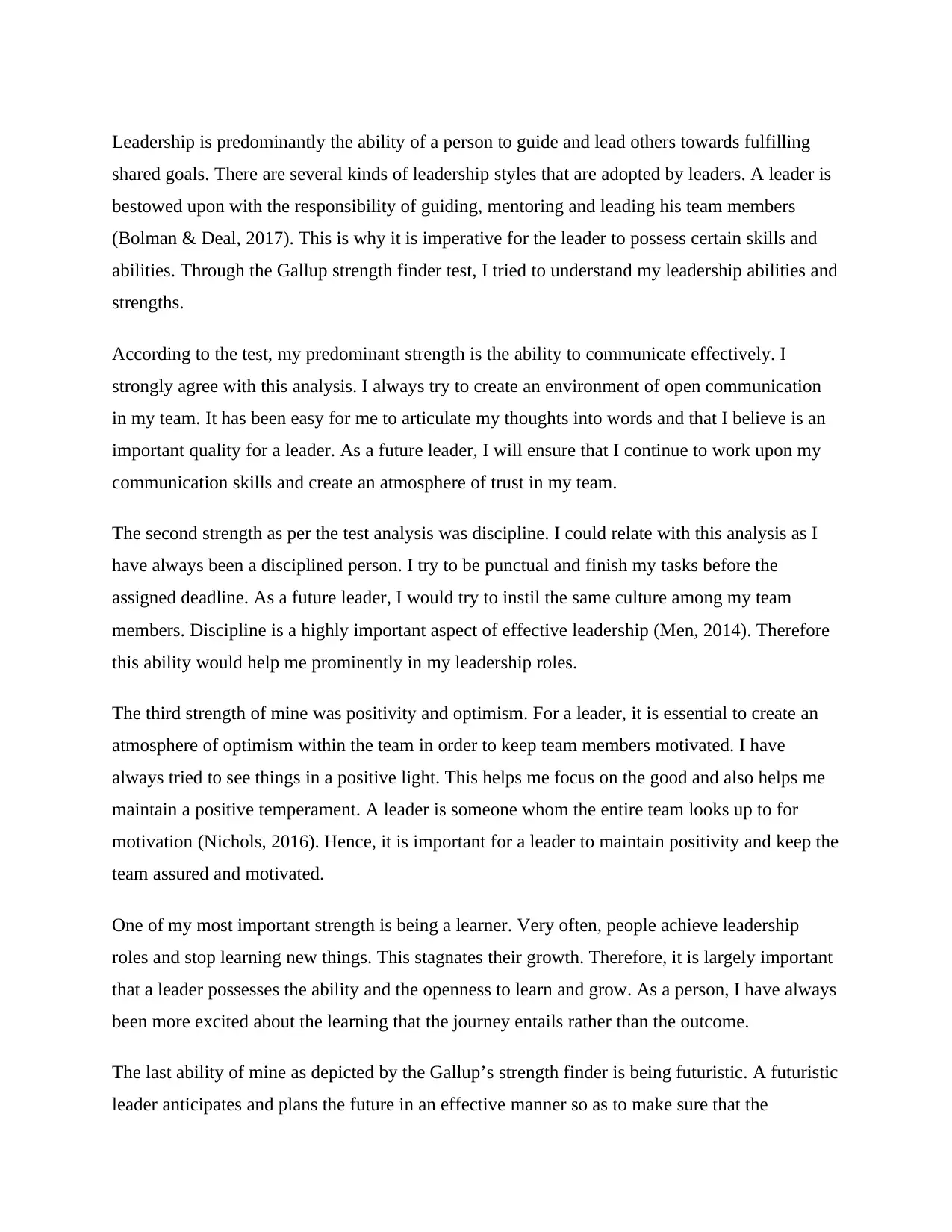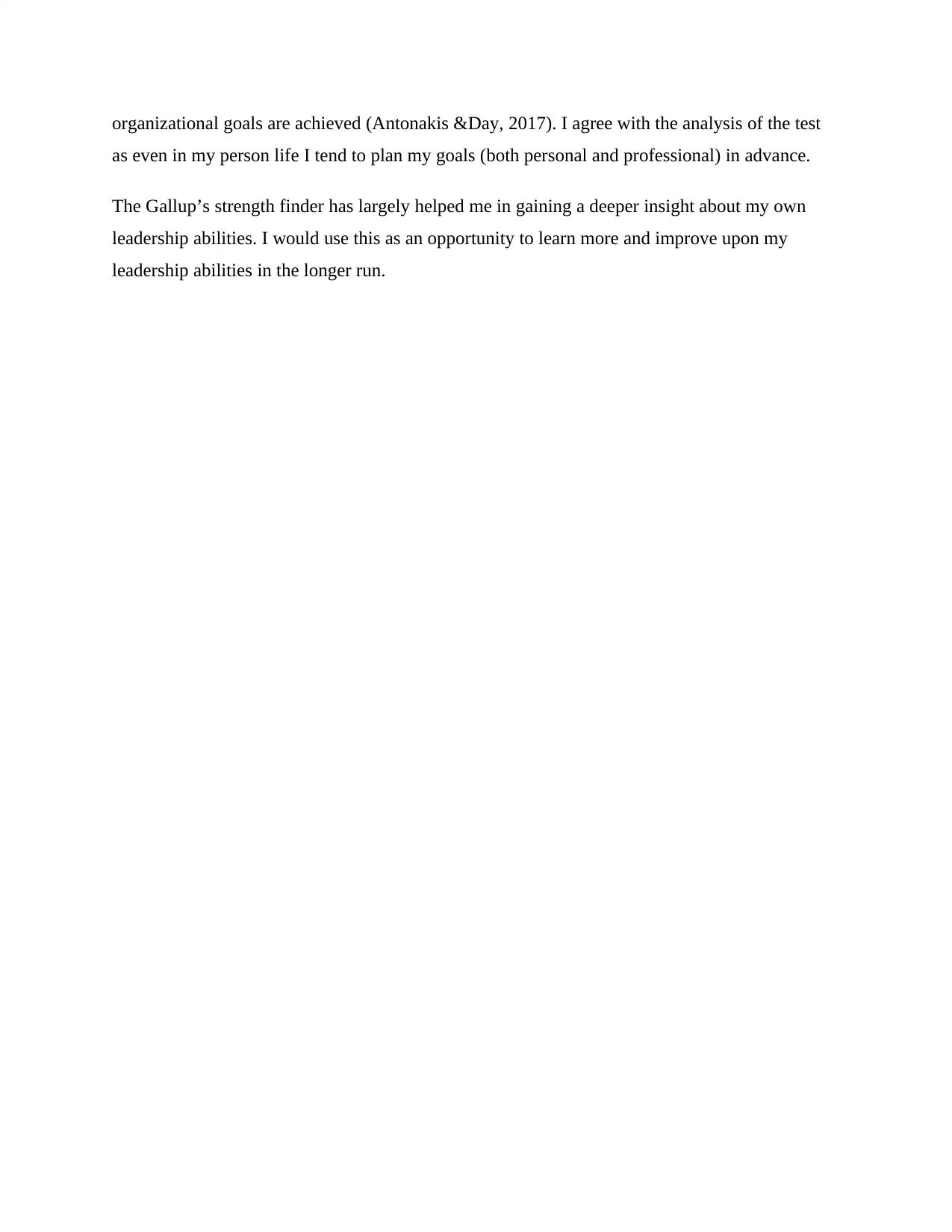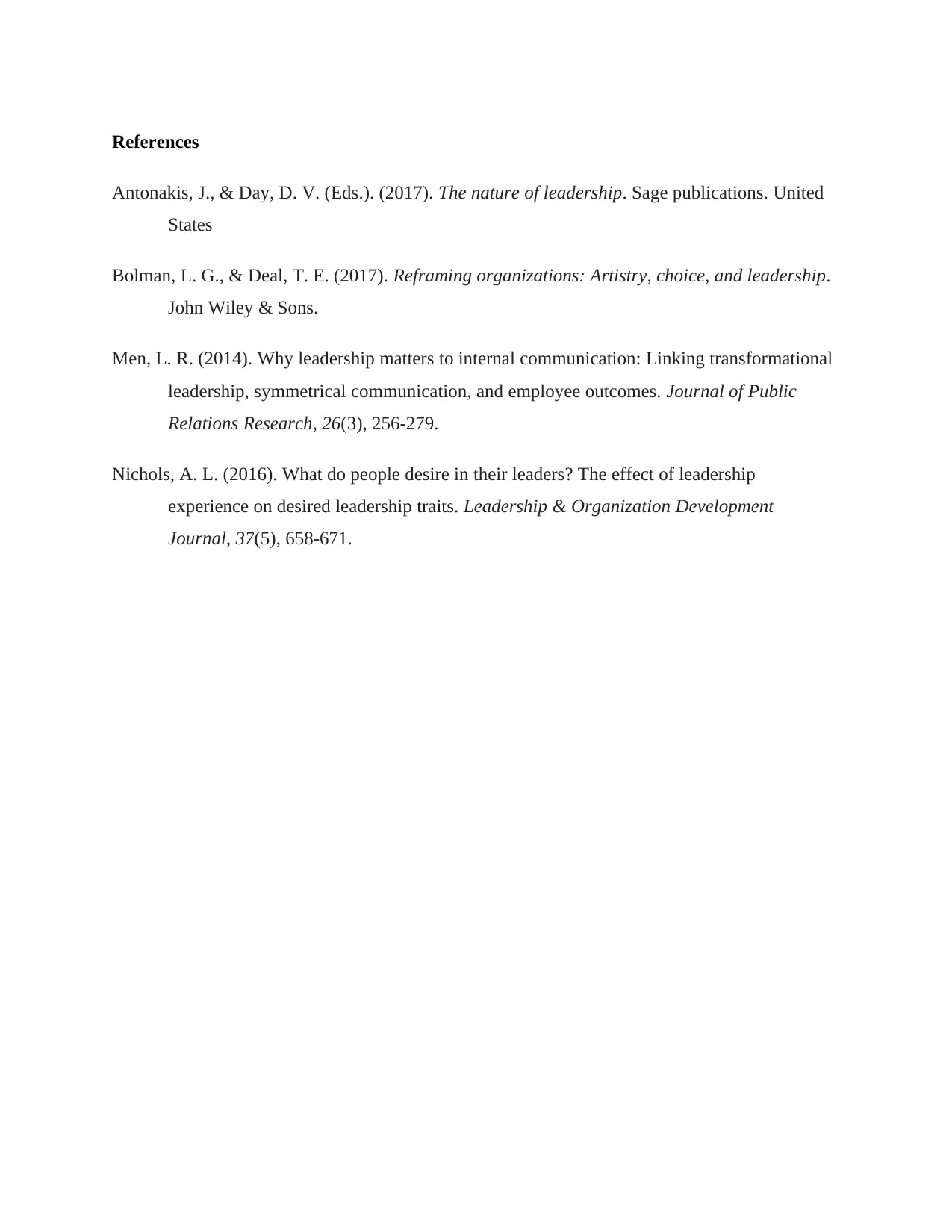MGT601 Dynamic Leadership: Reflective Analysis of Gallup Strengths
VerifiedAdded on 2023/06/10
|4
|699
|417
Essay
AI Summary
This essay is a reflective analysis of the author's leadership strengths as identified by the Gallup Strength Finder test. The author discusses their top strengths, including communication, discipline, positivity, being a learner, and futuristic thinking, and how these strengths contribute to their leadership abilities. The author reflects on how they can leverage these strengths to become a more effective leader in the future. This assignment is available on Desklib, a platform offering a wealth of academic resources, including past papers and solved assignments, to support students in their studies.

Dynamic Leadership
Reflective writing – Gallup’s strength finder test results
Reflective writing – Gallup’s strength finder test results
Paraphrase This Document
Need a fresh take? Get an instant paraphrase of this document with our AI Paraphraser

Leadership is predominantly the ability of a person to guide and lead others towards fulfilling
shared goals. There are several kinds of leadership styles that are adopted by leaders. A leader is
bestowed upon with the responsibility of guiding, mentoring and leading his team members
(Bolman & Deal, 2017). This is why it is imperative for the leader to possess certain skills and
abilities. Through the Gallup strength finder test, I tried to understand my leadership abilities and
strengths.
According to the test, my predominant strength is the ability to communicate effectively. I
strongly agree with this analysis. I always try to create an environment of open communication
in my team. It has been easy for me to articulate my thoughts into words and that I believe is an
important quality for a leader. As a future leader, I will ensure that I continue to work upon my
communication skills and create an atmosphere of trust in my team.
The second strength as per the test analysis was discipline. I could relate with this analysis as I
have always been a disciplined person. I try to be punctual and finish my tasks before the
assigned deadline. As a future leader, I would try to instil the same culture among my team
members. Discipline is a highly important aspect of effective leadership (Men, 2014). Therefore
this ability would help me prominently in my leadership roles.
The third strength of mine was positivity and optimism. For a leader, it is essential to create an
atmosphere of optimism within the team in order to keep team members motivated. I have
always tried to see things in a positive light. This helps me focus on the good and also helps me
maintain a positive temperament. A leader is someone whom the entire team looks up to for
motivation (Nichols, 2016). Hence, it is important for a leader to maintain positivity and keep the
team assured and motivated.
One of my most important strength is being a learner. Very often, people achieve leadership
roles and stop learning new things. This stagnates their growth. Therefore, it is largely important
that a leader possesses the ability and the openness to learn and grow. As a person, I have always
been more excited about the learning that the journey entails rather than the outcome.
The last ability of mine as depicted by the Gallup’s strength finder is being futuristic. A futuristic
leader anticipates and plans the future in an effective manner so as to make sure that the
shared goals. There are several kinds of leadership styles that are adopted by leaders. A leader is
bestowed upon with the responsibility of guiding, mentoring and leading his team members
(Bolman & Deal, 2017). This is why it is imperative for the leader to possess certain skills and
abilities. Through the Gallup strength finder test, I tried to understand my leadership abilities and
strengths.
According to the test, my predominant strength is the ability to communicate effectively. I
strongly agree with this analysis. I always try to create an environment of open communication
in my team. It has been easy for me to articulate my thoughts into words and that I believe is an
important quality for a leader. As a future leader, I will ensure that I continue to work upon my
communication skills and create an atmosphere of trust in my team.
The second strength as per the test analysis was discipline. I could relate with this analysis as I
have always been a disciplined person. I try to be punctual and finish my tasks before the
assigned deadline. As a future leader, I would try to instil the same culture among my team
members. Discipline is a highly important aspect of effective leadership (Men, 2014). Therefore
this ability would help me prominently in my leadership roles.
The third strength of mine was positivity and optimism. For a leader, it is essential to create an
atmosphere of optimism within the team in order to keep team members motivated. I have
always tried to see things in a positive light. This helps me focus on the good and also helps me
maintain a positive temperament. A leader is someone whom the entire team looks up to for
motivation (Nichols, 2016). Hence, it is important for a leader to maintain positivity and keep the
team assured and motivated.
One of my most important strength is being a learner. Very often, people achieve leadership
roles and stop learning new things. This stagnates their growth. Therefore, it is largely important
that a leader possesses the ability and the openness to learn and grow. As a person, I have always
been more excited about the learning that the journey entails rather than the outcome.
The last ability of mine as depicted by the Gallup’s strength finder is being futuristic. A futuristic
leader anticipates and plans the future in an effective manner so as to make sure that the

organizational goals are achieved (Antonakis &Day, 2017). I agree with the analysis of the test
as even in my person life I tend to plan my goals (both personal and professional) in advance.
The Gallup’s strength finder has largely helped me in gaining a deeper insight about my own
leadership abilities. I would use this as an opportunity to learn more and improve upon my
leadership abilities in the longer run.
as even in my person life I tend to plan my goals (both personal and professional) in advance.
The Gallup’s strength finder has largely helped me in gaining a deeper insight about my own
leadership abilities. I would use this as an opportunity to learn more and improve upon my
leadership abilities in the longer run.
⊘ This is a preview!⊘
Do you want full access?
Subscribe today to unlock all pages.

Trusted by 1+ million students worldwide

References
Antonakis, J., & Day, D. V. (Eds.). (2017). The nature of leadership. Sage publications. United
States
Bolman, L. G., & Deal, T. E. (2017). Reframing organizations: Artistry, choice, and leadership.
John Wiley & Sons.
Men, L. R. (2014). Why leadership matters to internal communication: Linking transformational
leadership, symmetrical communication, and employee outcomes. Journal of Public
Relations Research, 26(3), 256-279.
Nichols, A. L. (2016). What do people desire in their leaders? The effect of leadership
experience on desired leadership traits. Leadership & Organization Development
Journal, 37(5), 658-671.
Antonakis, J., & Day, D. V. (Eds.). (2017). The nature of leadership. Sage publications. United
States
Bolman, L. G., & Deal, T. E. (2017). Reframing organizations: Artistry, choice, and leadership.
John Wiley & Sons.
Men, L. R. (2014). Why leadership matters to internal communication: Linking transformational
leadership, symmetrical communication, and employee outcomes. Journal of Public
Relations Research, 26(3), 256-279.
Nichols, A. L. (2016). What do people desire in their leaders? The effect of leadership
experience on desired leadership traits. Leadership & Organization Development
Journal, 37(5), 658-671.
1 out of 4
Related Documents
Your All-in-One AI-Powered Toolkit for Academic Success.
+13062052269
info@desklib.com
Available 24*7 on WhatsApp / Email
![[object Object]](/_next/static/media/star-bottom.7253800d.svg)
Unlock your academic potential
Copyright © 2020–2026 A2Z Services. All Rights Reserved. Developed and managed by ZUCOL.



